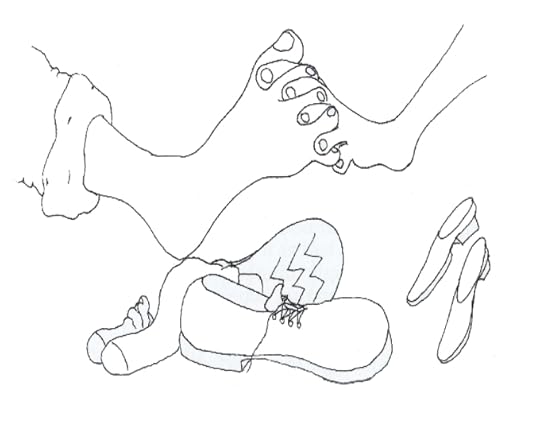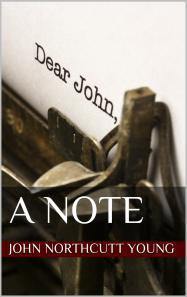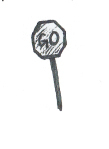Kurt Brindley's Blog, page 132
October 25, 2014
Holdin’ Toes
Holdin’ hands is supposed to be special,
But really, anyone can do it.
Just grab a hand and don’t let go,
That’s all there really is to it.
But my way of holdin’ is a little bit different.
In fact, I’m sure no one else even knows…
Just take off your shoes, and then your socks,
Cuz my way is holdin’ toes.
From Poem Man
FOR MORE LIKE THIS >> CLICK CLICK
Filed under: Poetry Tagged: abundance, affection, children's poetry, love, Poem Man, poems, poetry, poets, relationships, rhymes, rhyming poetry, wife, writing








October 24, 2014
Unless someone can prove otherwise, I am laying claim to the invention of this “Writer in Profile” emoticon…
/_(‘ )
#yesthisismystatusupdatenowandforever
#yesquicktip#1hastakenovermyonlineexistence
:)
FOR MORE LIKE THIS >> CLICK CLICK
Filed under: Humor, Writing Tagged: authors, emoticons, humor, media, Quick Tips, social media, social networks, status updates, Tagline Updates, taglines, writing, writing humor








To The Night
FOR MORE LIKE THIS >> CLICK CLICK
Filed under: Photography Tagged: nature, photography, pictures, silhouette, sunsets, trees








I WRITE, THEREFORE…
YOU ARE
#notetoself
#booksbuildbrains
#literaturedefinesme
#comingsoontoateeshirtnearyou
#noreallycheckoutmymerchpageandgivemeyourfeedbackplease
FOR MORE LIKE THIS >> CLICK CLICK
Filed under: Notes to Self Tagged: authors, merch, merch store, note to self, quotes, slogans, tee shirts, writers, writing








Celosia Extremes…with Eyes
FOR MORE LIKE THIS >> CLICK CLICK
Filed under: Photography Tagged: art, celosia, concept art, design, eyes, flowers, graphic art, graphic design, nature, photography, pictures








Where You Are We Cannot Go

Franz Kafka
With you
there we are
at the places we cannot go
with you
we go
you take us there with you
to the places we cannot go
You guide us
drive us
deep into the heart
into the dark
into the places we cannot go
Through the heat
through the snow
the snow
the bitter snow
the insufferable snow
with you through the snow
we lose ourselves
in the places we cannot go
crumbling castles in the sky
looming shadows
rampart mysteries
the eyes
spying eyes
lying eyes
the eyes coaxing us down
the endless trails
the trails without end
that lead us
to the places we cannot go
the hunger
the bitter hunger
we hunger
we are there
with you
and we hunger
insatiable
we live for the hunger
we hunger to be there with you
enduring trials indiscriminate
to be with you
to suffer
with you
the trial
the trials
the accusations of truths
for which we have no defense
FOR MORE LIKE THIS >> CLICK CLICK
Filed under: Art, Poetry Tagged: art, authors, drawing, fiction, Franz Kafka, literature, poems, poetry, short stories, The Castle, The Hunger Artist, The Trial, writing








In Contemplation of the Art and Act of Suicide – A Review
SHORT STORY | FICTION | LITERATURE
A NOTE by John Northcutt Young
RATING: ★ ★ ★
Some people should die
That’s just unconscious knowledge
- Jane’s Addiction
It is hard for me to imagine anyone past the age of puberty who has not contemplated suicide. I don’t mean actually contemplating committing suicide — although less hard, it is still kind of hard for me to imagine anyone who has lived a life of even the most minimal engagement to have not had at least one life crisis serious enough to trigger contemplation of even this most extreme act — but just suicide in general. If, hypothetically speaking, one were going to commit suicide, what would be the best way to perform the act? That is what I mean by contemplating suicide. Contemplating the art of suicide, so to speak.
And, with his short story A NOTE , that is exactly what author John Northcutt Young does. He forces us to contemplate suicide, and in a most uncomfortable and burdensome manner, by taking us deep into the mind of someone preparing himself for the final act of committing suicide.
, that is exactly what author John Northcutt Young does. He forces us to contemplate suicide, and in a most uncomfortable and burdensome manner, by taking us deep into the mind of someone preparing himself for the final act of committing suicide.
And he does this, not just by forcing us into the mind of the narrator as a casual observer, he shoves us directly into the story itself, as a participating character, by having us assume the most unpleasant role of “Whomever,” the unknown recipient to whom the narrator of the story is addressing his suicide note, a note that he is just beginning to pen when the story itself begins.
But we quickly learn that it is not going to be an easy note to write. And this is not just because of the obvious reasons. Penning one’s final farewell message must surely be difficult for even the most accomplished in life. Right now you may be thinking that that last sentence is ridiculous. If one is so accomplished in life then there would be no reason for one to even contemplate suicide, let alone actually commit it. My response to that is, the statement may be highly ironic perhaps, but ridiculous, certainly not. All we have to do is take even the most cursory of glances at recent headlines to see that yes, indeed, even the most accomplished — and I almost want say here, especially the most accomplished — find cause to put a suicidal end their living existence.
However, with this story, we find that the one penning the note is far from having led an accomplished life; in fact, as he sees it, he has led, perhaps, a life the least accomplished of all. And if it holds true that penning a suicide note would prove difficult for the most accomplished, we are about to find out just how exceedingly difficult it is for the least.
By his own account the narrator is a loser. He is unaccomplished at everything, especially his life goal, a life-long ambition to be a successful writer. Or is it an author. He is not sure which he should call himself. This indecision is typical, endemic even, of his character. We learn in the most repetitive, and somewhat distracting, way that the narrator has difficulty making even the most mundane of decisions, and those decisions that he does make, ultimately end in failure.
But his biggest failure, and even bigger regret, is that of failing as a writer. And here is where I have the biggest breakdown with the story.
The story is narrated in a near stream of consciousness voice. The narrator, finally having made the decision to end his life, is now free from having to worry about all the grammar and linguistic challenges writing entails. This freedom also seems to have impacted negatively the way his internal voice, his stream of consciousness voice, is spoken. The voice of the narrator sounds overly immature and whiny, which may be excused considering what he has put himself on the path to do, but this voice doesn’t speak true to me. I cannot imagine that anyone as close to committing suicide as our narrator is, would sound so petty and immature.
Near the end we learn that his suicide note is soggy from his tears. However, up to that point, I never felt once that the narrator had shed even the slightest tear. It was, unfortunately, one rather long, annoying whine, poor grammar and all.
But what does a critique like that mean really? My answer is, nothing.
How could I possibly know how others would speak to themselves internally, and not just for something as terrifying and dramatic as the internal processing of the final movement toward ending one’s life, but for anything, really? I can’t. The only voice I can ever know, the only voice I can ever truly critique, is the sound of my own voice. And I hope I never have to hear what it would sound like during such a heartbreaking situation as the narrator is experiencing.
My problem with the narrator’s voice and the negative impact I find that it has on the overall tone and success of the story, has to be more my problem, a problem of taste, and not the story’s.
Overall, and most importantly, the story works in achieving what is perhaps its truest and biggest mission, and that, to me is, the act of awareness. Whether we like the story or not, by its end we definitely become more aware, through Young’s insistence on forcing us into a deep, uncomfortable contemplative mind journey, of what it just may be like for one poor, desperate soul of a loser as he prepares himself for what perhaps is his final act alive.
And that, to me, is something worthy of serious and deep contemplation.
~~~~
Rating System:
★ = Unreadable
★ ★ = Poor Read
★ ★ ★ = Average Read
★ ★ ★ ★ = Outstanding Read
★ ★ ★ ★ ★ = Exceptional Read
Filed under: Reviews Tagged: authors, book reviews, books, depression, fiction, Indie Authors, John Northcutt Young, literature, review, reviews, short stories, suicide, writing








October 23, 2014
My Town
All my life I’ve lived in a town
Where stop means go
And up means down,
Where happy means sad
And black means white,
Where good means bad
And wrong means right,
Where night means day
And yes means no,
Where work means play
And fast means slow,
Where yesterday means tomorrow
And midnight means noon,
Where give means borrow
And later means soon,
Where lost means found
And water means ice,
Where square means round
And mean means nice.
So, if you ever visit
You’d better learn our ways,
Cuz if you ever try to leave
It means you’ll have to stay.
From Poem Man
FOR MORE LIKE THIS >> CLICK CLICK
Filed under: Poetry Tagged: children's poetry, opposites, Poem Man, poems, poetry, rhymes, rhyming poetry, towns, writing, Yin Yang








In Contemplation of the Art and Act of Suicide – A Review
SHORT STORY | FICTION | LITERATURE
A NOTE by John Northcutt Young
RATING: ★ ★ ★
Some people should die
That’s just unconscious knowledge
- Jane’s Addiction
It is hard for me to imagine anyone past the age of puberty who has not contemplated suicide. I don’t mean actually contemplating committing suicide — although less hard, it is still kind of hard for me to imagine anyone who has lived a life of even the most minimal engagement to have not had at least one life crisis serious enough to trigger contemplation of even this most extreme act — but just suicide in general. If, hypothetically speaking, one were going to commit suicide, what would be the best way to perform the act? That is what I mean by contemplating suicide. Contemplating the art of suicide, so to speak.
And, with his short story A NOTE , that is exactly what author John Northcutt Young does. He forces us to contemplate suicide, and in a most uncomfortable and burdensome manner, by taking us deep into the mind of someone preparing himself for the final act of committing suicide.
, that is exactly what author John Northcutt Young does. He forces us to contemplate suicide, and in a most uncomfortable and burdensome manner, by taking us deep into the mind of someone preparing himself for the final act of committing suicide.
And he does this, not just by forcing us into the mind of the narrator as a casual observer, he shoves us directly into the story itself, as a participating character, by having us assume the most unpleasant role of “Whomever,” the unknown recipient to whom the narrator of the story is addressing his suicide note, a note that he is just beginning to pen when the story itself begins.
But we quickly learn that it is not going to be an easy note to write. And this is not just because of the obvious reasons. Penning one’s final farewell message must surely be difficult for even the most accomplished in life. Right now you may be thinking that that last sentence is ridiculous. If one is so accomplished in life then there would be no reason for one to even contemplate suicide, let alone actually commit it. My response to that is, the statement may be highly ironic perhaps, but ridiculous, certainly not. All we have to do is take even the most cursory of glances at recent headlines to see that yes, indeed, even the most accomplished — and I almost want say here, especially the most accomplished — find cause to put a suicidal end their living existence.
However, with this story, we find that the one penning the note is far from having led an accomplished life; in fact, as he sees it, he has led, perhaps, a life the least accomplished of all. And if it holds true that penning a suicide note would prove difficult for the most accomplished, we are about to find out just how exceedingly difficult it is for the least.
By his own account the narrator is a loser. He is unaccomplished at everything, especially his life goal, a life-long ambition to be a successful writer. Or is it an author. He is not sure which he should call himself. This indecision is typical, endemic even, of his character. We learn in the most repetitive, and somewhat distracting, way that the narrator has difficulty making even the most mundane of decisions, and those decisions that he does make, ultimately end in failure.
But his biggest failure, and even bigger regret, is that of failing as a writer. And here is where I have the biggest breakdown with the story.
The story is narrated in a near stream of consciousness voice. The narrator, finally having made the decision to end his life, is now free from having to worry about all the grammar and linguistic challenges writing entails. This freedom also seems to have impacted negatively the way his internal voice, his stream of consciousness voice, is spoken. The voice of the narrator sounds overly immature and whiny, which may be excused considering what he has put himself on the path to do, but this voice doesn’t speak true to me. I cannot imagine that anyone as close to committing suicide as our narrator is, would sound so petty and immature.
Near the end we learn that his suicide note is soggy from his tears. However, up to that point, I never felt once that the narrator had shed even the slightest tear. It was, unfortunately, one rather long, annoying whine, poor grammar and all.
But what does a critique like that mean really? My answer is, nothing.
How could I possibly know how others would speak to themselves internally, and not just for something as terrifying and dramatic as the internal processing of the final movement toward ending one’s life, but for anything, really? I can’t. The only voice I can ever know, the only voice I can ever truly critique, is the sound of my own voice. And I hope I never have to hear what it would sound like during such a heartbreaking situation as the narrator is experiencing.
My problem with the narrator’s voice and the negative impact I find that it has on the overall tone and success of the story, has to be more my problem, a problem of taste, and not the story’s.
Overall, and most importantly, the story works in achieving what is perhaps its truest and biggest mission, and that, to me is, the act of awareness. Whether we like the story or not, by its end we definitely become more aware, through Young’s insistence on forcing us into a deep, uncomfortable contemplative mind journey, of what it just may be like for one poor, desperate soul of a loser as he prepares himself for what perhaps is his final act alive.
And that is something worthy of serious and deep contemplation.
~~~~
Rating System:
★ = Unreadable
★ ★ = Poor Read
★ ★ ★ = Average Read
★ ★ ★ ★ = Outstanding Read
★ ★ ★ ★ ★ = Exceptional Read
Filed under: Reviews Tagged: authors, book reviews, books, depression, fiction, Indie Authors, John Northcutt Young, literature, review, reviews, short stories, suicide, writing








The way forward for our little “Indie Author Book Selection & Review” flash of a grassroots response thing we got going here…
I guess there is something to be said for operating on leftover pizza highs…
First off, I believe both a sincere thank you and a hearty congratulations are in order.
We’ve had quite the response to the “Hey Author, what’s your book about?” post from a few days back.
And for that, I say, from the bottom of my heart to the tips of my inked and computer key calloused fingers, Thank you all very much.
To date, fourteen awesome Authors have submitted their books for consideration. (And there is still two days left until submissions will be closed so if you’re considering it even a little bit, times running out so let’s chop chop to it, okay Authors), sixteen votes have been cast for favorite Authors, and 108 Readers have given a thumbs up of “Like” for the overall concept of this grassroots Indie movement that we started and is taking off right before our eyes.
And for that, I congratulate you. You all are just the greatest, and, with your greatness, you are exemplifying all that is possible, in the most positive terms, in what this little experiment called the Internet has to offer.
So, what’s next?
I don’t know if you’ve been following the updates or have seen the timeline on my sidebar, but here is the way forward:
In less than an hour, at 8:00PM tonight, I will post my review of John Northcutt Young’s story A NOTE.
Which means, I will soon be in the market for a new story to read.
Tomorrow night, Friday at 11:59PM to be exact, I will close the comments section down on the original solicitation announcement.
And then on Monday at 8:00PM, I will announce my selection of the next book I will read and review.
See the right sidebar for the complete timeline.
Okay?
Great.
And then, after that, we, and by we I mean you all will have to decide if we have enough momentum to do this all again.
I sure hope so…
WRITE ON!
Filed under: Books, Reviews Tagged: authors, book reviews, fiction, grassroots movements, Indie Authors, reviews, short stories, writers, writing
















